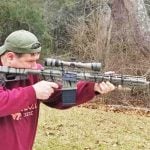“Wash your hands.” Our parents tell us that from early childhood. That’s good advice, especially for kids who constantly have their mitts in their mouths after handling God knows what. But adults benefit too. For instance, three years into the pandemic, I have yet to contract COVID-19. I partially attribute that happy fact to my being a hand-washing fiend. Washing your hands regularly is a good habit to have, including when you’ve been to the range or handling firearms and ammunition. Now, before you scoff about anti-gunners ginning up fear to discourage shooting and hunting, let me assure you that I share your skepticism. After all, states that restrict lead ammo in hunting also try to outlaw steel bullets as “armor piercing.” That contradiction is no doubt intentional.
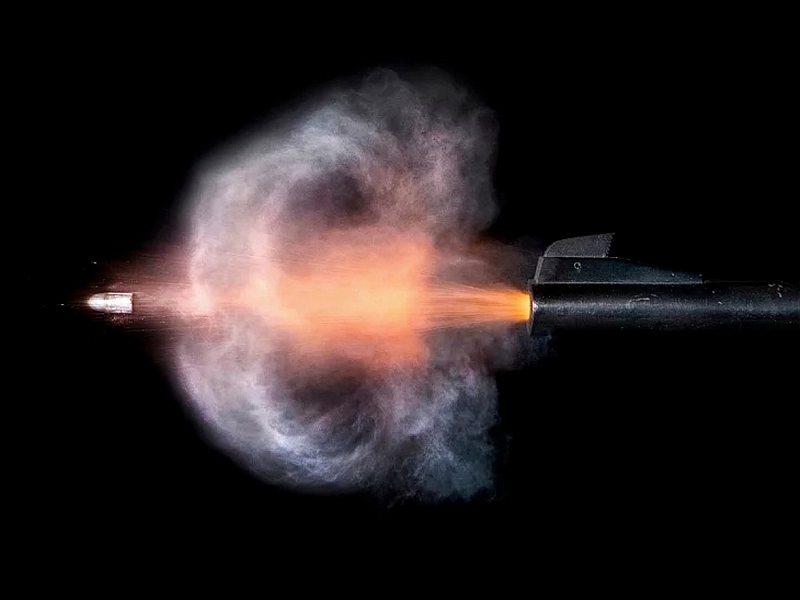
But lead poisoning is real, and those of us who shoot are exposed to it, anti-gun propaganda or not. So, let’s take a brief look at how we’re exposed to lead and talk about some modest steps to mitigate that exposure.
Lead Exposure from Firearms and Ammo
Most ammo contains lead and has done so for centuries. Lead is the softest metal, so it’s easily manipulated into bullets. It’s also heavy, meaning it delivers significant kinetic energy to the target, making for surer kills on game animals. That kinetic energy also factors into self-defense effectiveness. Finally, lead’s propensity to fragment upon impact creates a larger wound channel in game and mitigates overpenetration. Again, those aspects translate well to self-defense applications.
Lead Exposure from Firing
Those qualities make it perfect for ammunition. But the soft nature of lead also makes it vulnerable to the intense heat of primer ignition. When a cartridge’s primer, many of which contain lead, ignites the gunpowder, part of the lead bullet vaporizes and is expelled into the surrounding air. So is much of the lead from the primer. That vaporized lead disperses in about a 5-foot radius from the firearm. It’s inhaled by the shooter and anyone else in that radius. It also permeates skin, clothing, and gear, and coats hard surfaces.
The only way to avoid that process is to fire lead-free ammo, which includes the primer. Unfortunately, lead-free ammo is more expensive and not always available, especially in less popular calibers. Fully jacketed bullets, sometimes called “total metal jacket” (TMJ) are another option. Even full metal jacket (FMJ) rounds leave some lead exposed, but not TMJ. But, again, TMJ rounds are more expensive, and availability is limited.
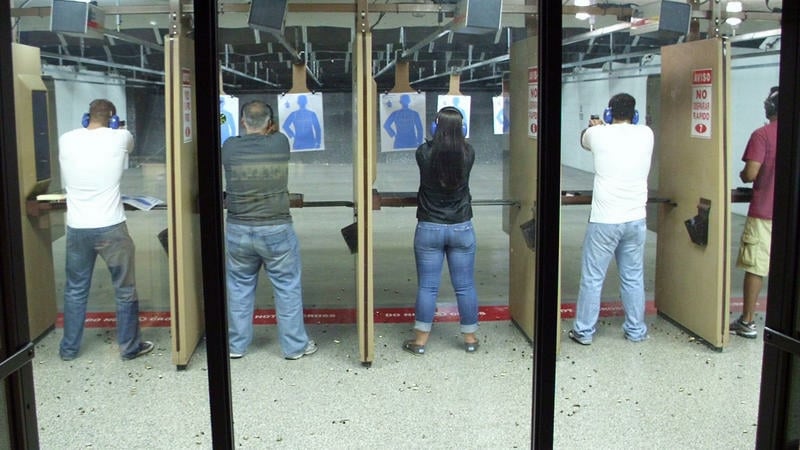
This problem is exacerbated by poor ventilation. Shooting outdoors is ideal, though it certainly doesn’t eliminate the problem. But many shooters have no access to an outdoor range. Well-run indoor ranges are equipped with specialized ventilation systems to mitigate lead vapor and dust, but they can’t get it all. It literally settles on everything, including the walls and ceiling, requiring regular, thorough cleaning. Just sweeping the floor doesn’t cut it. No matter where you shoot, indoors or out, lead residue is a fact of life.
But, as noted, good indoor ranges employ modern ventilation, High Energy Particulate (HEPA) cleaning systems, and filtered air. Both the NRA and the National Shooting Sports Foundation (NSSF) say that lead problems at indoor ranges are very rare. I can’t say whether that’s so or not, but it’s probably a good idea to ask indoor range managers about their lead reduction processes.
Lead Exposure from Cleaning
We’ve established that each trigger pull releases a certain amount of lead residue on everything around the shooter. Another reason lead makes great bullets is that its softness allows positive engagement with barrel rifling. Of course, non-lead ammo engages too, but lead does it better.
That engagement means additional lead residue in the barrel’s lands and grooves. Your entire firearm will be covered in lead residue, as will any brass casings you picked up for reloading. Most of us dislike cleaning our guns. I know I don’t do it as often as I should. But when you do, just be aware that you’re engaging with lead residue the entire time.
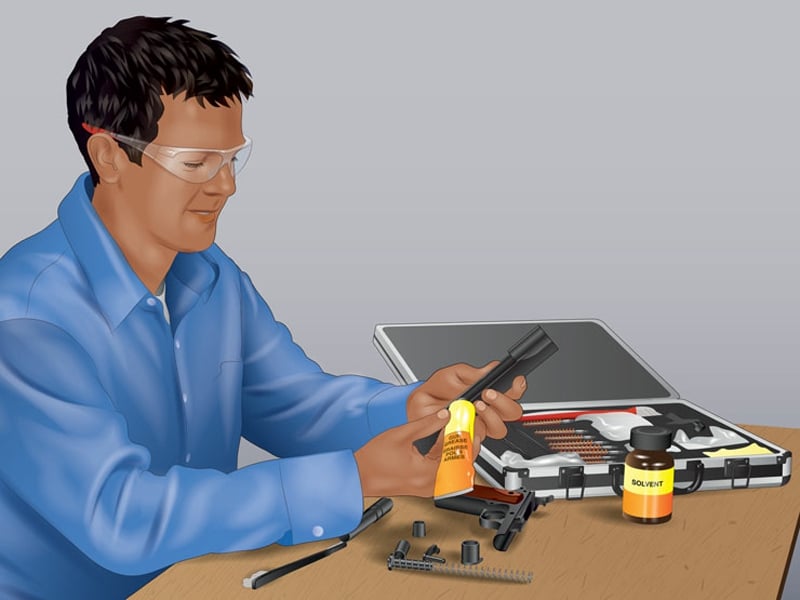
How We Absorb Lead
Lead is an element, so it doesn’t break down. Humans and other animals absorb it through our skin, by breathing the residue, through mucous membranes, through our eyes, and by ingestion.
According to the National Park Service, those of us who eat wild game taken with lead bullets likely ingest small amounts of lead left behind when the bullet fragments upon impact, even if the meat surrounding the wound channel is discarded. Additionally, eating, drinking, or smoking on the range means we probably ingest lead residue. Or maybe hitting a drive-thru on the way home from the range, when you’re still covered with that residue.
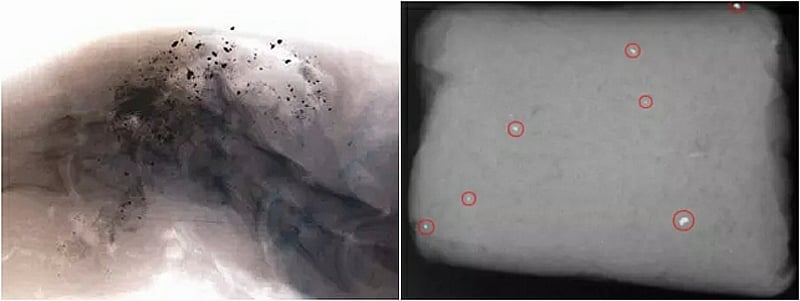
Children are especially affected by lead ingestion. Adults absorb 20% of ingested lead. Children absorb 70%. Pregnant women absorb lead much faster than those who are not pregnant thanks to metabolic changes caused by pregnancy. Those women can and will pass absorbed lead through the placenta to their unborn child.
According to the Environmental Protection Agency (EPA), the 7.5 grams of lead in a 9mm bullet, fully dissolved, would contaminate the amount of water consumed daily by 496,800 people. Yes, I get that the EPA is no friend to hunters and shooters. I can’t say whether that figure is exaggerated or not. But it’s certainly worth mentioning when discussing lead toxicity.
Effects of Lead Exposure
As with anything, lead exposure affects people in different ways. Some folks may show symptoms sooner than others. Some may be more severe. Some may not show them at all. But here are some of the possible effects:
- Memory loss and difficulty concentrating
- Fatigue
- Irritability and aggressiveness
- Loss of sexual prowess
- High Blood Pressure
- Abdominal Pain
- Constipation
- Joint and Muscle Pain
- Pain, tingling, or numbness in the extremities
- Headache
- Moodiness
- Reduced sperm count or abnormal sperm
- Miscarriage or premature birth for pregnant women
Of course, those symptoms may be caused by any number of things. The only way to tell for certain if you are suffering from lead poisoning is a blood test. According to the Centers for Disease Control and Prevention (CDC), children are more vulnerable to lead poisoning than adults because their brains are still forming.
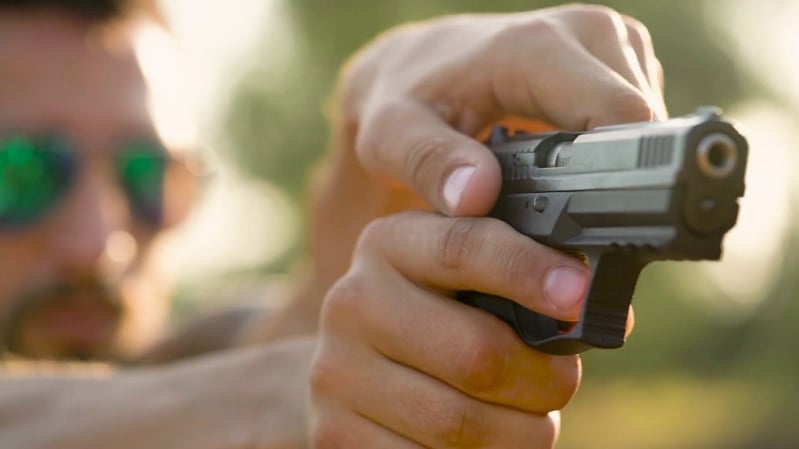
Precautions
Look, I’m not telling you that you’re going to die, or even get sick, from lead exposure caused by shooting. Life is a series of risks that we assume when we step out our front door. Fear of risk has ruined plenty of fun things in my lifetime. Ever notice that diving boards are disappearing from pools? It’s because pools aren’t willing to risk being sued. And I’m old enough to remember having fun playing lawn darts before they were outlawed as being too dangerous. So, I’m not about that at all.
Honestly, most people never have problems with lead poisoning. But there are some easy things you can do to mitigate your exposure without spoiling the fun:
- WASH YOUR HANDS. It’s easy and it’s a good habit to have anyway. But use cold water when washing away lead. Warm or hot water opens the pores and aids the absorption of lead on your skin.
- Wash your clothes immediately after a range trip.
- Clean your guns in a well-ventilated area.
- Consider wearing nitrile gloves when cleaning your guns. Latex gloves won’t hold up to solvents.
- Wear eye protection while shooting to mitigate direct eye exposure to lead residue. Of course, you should be using eye pro anyway.
- Consider wearing eye pro when cleaning your guns.
- Clean your guns on a non-porous surface, like a gun mat, that won’t absorb lead residue. This means I’ll finally have to get rid of my greasy old cleaning towel.
- Clean your eye protection and cleaning mat after every session.
- There are specialized wipes and soap for dealing with lead residue, but they aren’t cheap. The two most prominent brands are Hygenall Hex Off and D-Lead. Up to you.
- Keep in mind that everyday hand sanitizers do not remove heavy metal residue.
- Some folks have dedicated range shoes or boots since that’s an easy way to track lead residue into your house. Again, that’s up to you.

Conclusion
Lead residue is a real thing. We know it can cause problems. We also know that shooters are and will continue to be exposed to that residue as long as we continue to shoot. That’s one of those risks we mentioned earlier. As for me, I’ve been shooting for almost half a century. I’m not stopping now. Nor will I stop hunting and eating the meat from harvested game.
Honestly, the risks are relative based on where you shoot, what kind of ammo you use, how often you shoot, and many other things. Only you can assess your situation. But, no matter what, there are some easy things you can do to mitigate what risk there is. As with any such thing, I don’t believe in mandates. But after researching and writing this article, I’ll be implementing a few things beyond my normal handwashing routine. Consider doing the same.
Thanks to USA Carry’s Ben Findley for gathering much of the information discussed in this article.


